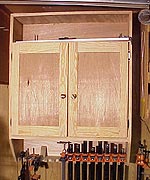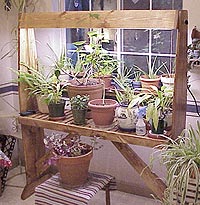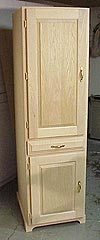This is a Veteran Owned site
It Gets BetterLearning woodworking is fun, and frustrating at timesText & photos by Tom Hintz Woodworking is a very rewarding hobby, but it can also be frustrating, especially during the initial learning process. New woodworkers may suffer through a period during which their choice of projects overlooks still-developing skills.
Asking questions, reading books and magazines, or studying other woodworkers techniques all benefit the learning process. However, none are truly effective if not combined with hands on experience. Knowing how something should be done does not automatically translate to being able to do it that way. The up side is that woodworking projects are not only fun and instructive; they provide an accurate gauge of your learning progress. The downside is that same gauge can be brutally honest in revealing your shortcomings. Woodworkers with decades of experience say they never stop learning. That is undoubtedly true, but of little consolation to those approaching the steepest part of the learning curve. Inclines look steepest from the bottom, and the learning curve of woodworking is no different. I have felt the pangs of frustration when things do not go as planned in the shop. My early projects seldom turned out exactly as I envisioned and I wasted too much wood. However, that is beginning to change. The time spent working on those early projects is improving what I build now.
I would like to say I am out of the learning woods, but I am not. Lately the trees are thinning slightly, and that is encouraging. What is most important right now is that I am more comfortable in the shop, and getting better at using my tools. Perhaps more than anything else, I have noticed an improvement in my ability to measure, lay out and make cuts accurately. Part of that comes from using the right tools and using them properly. The rest is a function of experience. Since beginning woodworking, the fit of the parts I make has progressed from terrible to good. I anticipate being able to measure twice and cut once in the near future, not measure (at least) twice, cut once, trim a couple of times, then make another part to replace the now too-short one. Another heartening aspect of my woodworking is becoming more capable of taking a project from an idea through construction. Certainly, learning to make project choices favoring my capabilities helps. Two recent projects, my "shop cabinet" and "grow light stand" were breakthrough projects that helped me realize I am getting better at woodworking. At this writing, I am nearing completion of a chimney cupboard that is the most challenging and my best effort to date. Throughout construction, I was comfortable performing tasks that caused concern not so long ago. There are a few mistakes, but they are minor and do not affect the appearance or function of the piece. Though I feel good about my progress in learning woodworking, I am fully aware I have a long way to go. There is a whole world of techniques and procedures to be learned and a never ending list of yet to be conceived ideas to be built. I know there are new woodworkers out there who are frustrated with their capabilities. Some wonder if they will ever get the hang of this hobby, or be able to build the more complicated projects others do. Hang on. It gets better. Recently, a novice woodworker asked me how long it was going to take him to gain a reasonable amount of proficiency. Even if I was qualified to make such a determination, I think it would be difficult if not impossible. Woodworking is, for most of us, a hobby. That means there is a huge disparity in the number of hours we can devote to the shop. In addition, everyone learns at different rates. New woodworkers should learn and practice workshop safety immediately, then avoid putting pressure on themselves to learn the rest. What is important is to have faith in your ability to learn, and have a good time doing it. Woodworking is and should remain fun throughout the learning process. There will be periods of frustration and even days when you should stay out of the shop. When frustration builds, learning suffers. Take a break and return with a clear head. Pick projects that are fun to build and a little challenging to your skills. If you are having fun while working in your shop, you are probably learning as well. Do you have a comment about this page? - Email Me!
|
All written, photographic and drawn materials are property of and copyright by NewWoodworker.com LLC 2000-2019. Materials may not be used in any way without the written permission of the owner.



